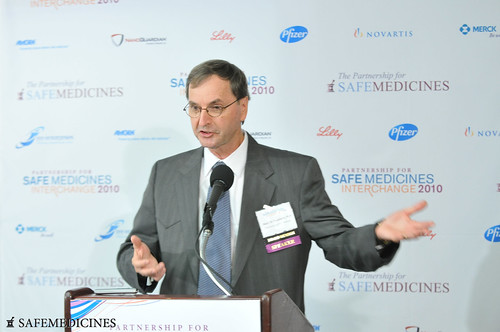USAID: Fighting Counterfeit Malaria Drugs Worldwide
Drug resistance as a result of the proliferation of counterfeit/low dose treatments is a growing problem in the fight against malaria. USAID is leading the charge to combat counterfeit malaria treatments in the places where malaria drug resistance is developing.
Drug counterfeiters, exploiting a captive audience in malaria sufferers, have helped create artemisinin-resistant malaria strains along the Thai/Cambodia and Thai/Myanmar borders. Counterfeit versions of malaria drugs have proliferated along the war-torn borders in Southeast Asia, and are also showing up in several African nations.

Dr. Marv Shepard on Counterfeit Drug Crime: "It's a huge problem. We're not going to
solve it internally in this country. We've got to work with a lot of other countries to solve it."
Drug resistance as a result of the proliferation of counterfeit/low dose treatments is a growing problem in the fight against malaria. USAID is leading the charge to combat counterfeit malaria treatments in the places where malaria drug resistance is developing.
While there is currently no vaccine for malaria, various drugs have been used as a cure. Artemisinin, a drug derived from a Chinese herb long used to treat malaria, is part of a combination therapy that is currently the most successful treatment for malaria. Drug counterfeiters, exploiting a captive audience in malaria sufferers, have helped create artemisinin-resistant malaria strains along the Thai/Cambodia and Thai/Myanmar borders. Counterfeit versions of malaria drugs have proliferated along the war-torn borders in Southeast Asia, and are also showing up in several African nations.
For this reason, USAID has studied the issue of counterfeit malaria drugs, and developed an educational campaign to try a keep counterfeit malaria drugs out of the hands of malaria sufferers. In 2009, USAID created public service announcements for Cambodia to warn of the dangers of counterfeit drugs.
As Dr. Shepherd said at the time: “The prevalence of counterfeit drugs in Cambodia is due in part to strained economic conditions and is indicative of what many citizens of developing countries face. Counterfeit drugs can be an attractive option for low-income patients because they are normally sold for less than authentic medicines.”
Additionally, USAID has helped other nations establish post-market surveillance, and drug testing campaigns to try and minimize the threat of counterfeit malaria treatments in the world’s hardest hit regions. In a 2011 report to Congress, USAID described their efforts and the challenges they continue to face, estimating that 30% of the global population lacks regular access to medicine. In the poorest areas of Africa and Asia, greater than 50% patients lack access to treatment.
Worldwide medicine counterfeit causes deaths of victims easily saved by authentic medications. Learn more about how global cooperation between countries and law enforcement agencies tries to curb the spread of counterfeit drugs at 2012 Interchange on September 28th in Washington DC. Discount early ticket sales end August 15th, so register today.